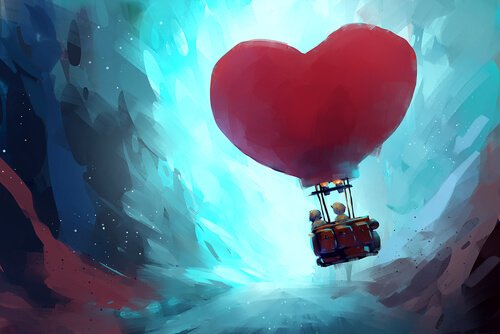Loving Without Anxiety is the Mature Way to Love


Written and verified by the psychologist Valeria Sabater
Loving without attachment, without becoming dependent, is loving without being needy. It’s freely and consciously giving yourself to the other person. It’s being part of a project in which there are no losers. There’s no need to give up your identity, and there’s no room for narcissism. Being in a relationship like this one is possible. All you need are clear boundaries and a clear understanding of certain principles. In this kind of relationship, it doesn’t matter how much your partner loves you. The important thing is how they love you.
Before delving any deeper into this idea, we have to be clear about what we mean when we talk about attachment in this context. From an ethological point of view, nothing is more important for human beings (especially for newborns) than this emotional bond. It’s an intense and long-lasting bond that is essential for human development. It’s the impression that healthy love makes on you and helps you develop and build your personality.
“Creating a dependent relationship means giving up your soul in exchange for false pleasure and security.” [translation]
-Walter Riso-
Now, from the point of view of romantic relationships, an attachment means something else. It’s clear that we all need a secure foundation, we need to know that our partner is there for us. You want to know that you’re loved, that there are commitments and agreements that solidify your relationship. However, this term often encompasses a situation that is full of fear and insecurity.
Building a relationship based on attachment means that partners need each other as a child needs its parents. They depend on each other for validation, nourishment, and to find their place in the world. This is an immature love based on needs, fears, and dependence.

Love without attachment
Loving without development dependence isn’t easy. That is true because most of us are used to loving with conditions. We want lovers that adjust to us. We want them to fill the emptiness and soothe our loneliness. They’re supposed to fix our broken parts and give us wings to fly. We want it all, but we forget the most important thing: starting with ourselves.
No one is responsible for rescuing you. No one has to rebuild your life or make you what you’ve always dreamed of being. The responsibility is yours alone. We are, however, used to giving ourselves over to our partners with the hope that they’ll make us feel complete. We want them to satisfy all our needs. This type of psychological and emotional dynamic is due almost exclusively to the type of society we grew up in.
From a very young age, our culture communicates the idea that happiness is synonymous with possessing things. This just leads us to a distressing emotional reality: that we always feel like we’re missing something. As a result, our entire existence is shaped around accumulating things with the hope that they’ll make us feel good. We develop an obsessive attachment to things, ideas, and people. We believe that we can give meaning to our lives this way.

This type of attachment is detrimental. It makes you eternally captive to whatever it is you think you’re missing. You start needing things and people not out of genuine need, but due to a social and emotional impulse. It’s a blind mechanism that leads to suffering and fear.
Is this type of existence worth it? Of course not. Realizing that will allow you to create healthier relationships. Not only that, but you can live a happier and more satisfying life.
How to love without attachment or anxiety
Loving based on dreams and not needs means loving the other person just as they are, not how you wish they were. It’s loving another person like you love the sun, the moon, and the stars. They can’t belong to you, nor would you want them to. But you appreciate that they’re there every day, giving you light, inspiring you, and accompanying you on your journey. The fact that you can’t own them doesn’t mean you can’t enjoy them.
Let’s see some strategies to love without attachment and to have a dependence-free relationship.
Make a statement. Start with yourself!
- Declare yourself emotionally free. Understand that you don’t need anyone to be happy. You should be able to be happy by yourself, with yourself. You should recognize yourself as valuable and worthy.
- Declare yourself unattached. Free yourself from fear of abandonment. Free yourself from the anxiety and worry that you might end up alone. One by one, undo all of your attachments (ideals, plans, inherited false conceptions…). Be capable of giving yourself to someone else. Not out of need, not to fill your emptiness, but from a place of freedom.
Love without attachment or need
- Remember that poisoned love doesn’t just imply an obsessive need to possess the other person. It’s also the inability to give up that person when the bond is harmful.
- Loving is being very clear about what “love without boundaries” means. It means suffering, depression, jealousy, emotional chaos, low self-esteem, and dependence.
- Loving is investing in your personal growth and the growth of your loved one. It’s giving space to just be. That, in turn, enriches the relationship.

Likewise, you should be capable of erecting a relationship on a foundation of free exchange. It should be free of anxiety and insecurity. These are bonds free of obsessive need. Instead, there’s strength and generosity. This happens due to trust and mutual understanding. You know you’re loved, so you can let the other person be. I trust the person who chose me. They love who I am and aren’t with me just to keep the ghost of loneliness away…
Loving without attachment, without becoming dependent, is loving without being needy. It’s freely and consciously giving yourself to the other person. It’s being part of a project in which there are no losers. There’s no need to give up your identity, and there’s no room for narcissism. Being in a relationship like this one is possible. All you need are clear boundaries and a clear understanding of certain principles. In this kind of relationship, it doesn’t matter how much your partner loves you. The important thing is how they love you.
Before delving any deeper into this idea, we have to be clear about what we mean when we talk about attachment in this context. From an ethological point of view, nothing is more important for human beings (especially for newborns) than this emotional bond. It’s an intense and long-lasting bond that is essential for human development. It’s the impression that healthy love makes on you and helps you develop and build your personality.
“Creating a dependent relationship means giving up your soul in exchange for false pleasure and security.” [translation]
-Walter Riso-
Now, from the point of view of romantic relationships, an attachment means something else. It’s clear that we all need a secure foundation, we need to know that our partner is there for us. You want to know that you’re loved, that there are commitments and agreements that solidify your relationship. However, this term often encompasses a situation that is full of fear and insecurity.
Building a relationship based on attachment means that partners need each other as a child needs its parents. They depend on each other for validation, nourishment, and to find their place in the world. This is an immature love based on needs, fears, and dependence.

Love without attachment
Loving without development dependence isn’t easy. That is true because most of us are used to loving with conditions. We want lovers that adjust to us. We want them to fill the emptiness and soothe our loneliness. They’re supposed to fix our broken parts and give us wings to fly. We want it all, but we forget the most important thing: starting with ourselves.
No one is responsible for rescuing you. No one has to rebuild your life or make you what you’ve always dreamed of being. The responsibility is yours alone. We are, however, used to giving ourselves over to our partners with the hope that they’ll make us feel complete. We want them to satisfy all our needs. This type of psychological and emotional dynamic is due almost exclusively to the type of society we grew up in.
From a very young age, our culture communicates the idea that happiness is synonymous with possessing things. This just leads us to a distressing emotional reality: that we always feel like we’re missing something. As a result, our entire existence is shaped around accumulating things with the hope that they’ll make us feel good. We develop an obsessive attachment to things, ideas, and people. We believe that we can give meaning to our lives this way.

This type of attachment is detrimental. It makes you eternally captive to whatever it is you think you’re missing. You start needing things and people not out of genuine need, but due to a social and emotional impulse. It’s a blind mechanism that leads to suffering and fear.
Is this type of existence worth it? Of course not. Realizing that will allow you to create healthier relationships. Not only that, but you can live a happier and more satisfying life.
How to love without attachment or anxiety
Loving based on dreams and not needs means loving the other person just as they are, not how you wish they were. It’s loving another person like you love the sun, the moon, and the stars. They can’t belong to you, nor would you want them to. But you appreciate that they’re there every day, giving you light, inspiring you, and accompanying you on your journey. The fact that you can’t own them doesn’t mean you can’t enjoy them.
Let’s see some strategies to love without attachment and to have a dependence-free relationship.
Make a statement. Start with yourself!
- Declare yourself emotionally free. Understand that you don’t need anyone to be happy. You should be able to be happy by yourself, with yourself. You should recognize yourself as valuable and worthy.
- Declare yourself unattached. Free yourself from fear of abandonment. Free yourself from the anxiety and worry that you might end up alone. One by one, undo all of your attachments (ideals, plans, inherited false conceptions…). Be capable of giving yourself to someone else. Not out of need, not to fill your emptiness, but from a place of freedom.
Love without attachment or need
- Remember that poisoned love doesn’t just imply an obsessive need to possess the other person. It’s also the inability to give up that person when the bond is harmful.
- Loving is being very clear about what “love without boundaries” means. It means suffering, depression, jealousy, emotional chaos, low self-esteem, and dependence.
- Loving is investing in your personal growth and the growth of your loved one. It’s giving space to just be. That, in turn, enriches the relationship.

Likewise, you should be capable of erecting a relationship on a foundation of free exchange. It should be free of anxiety and insecurity. These are bonds free of obsessive need. Instead, there’s strength and generosity. This happens due to trust and mutual understanding. You know you’re loved, so you can let the other person be. I trust the person who chose me. They love who I am and aren’t with me just to keep the ghost of loneliness away…
This text is provided for informational purposes only and does not replace consultation with a professional. If in doubt, consult your specialist.







